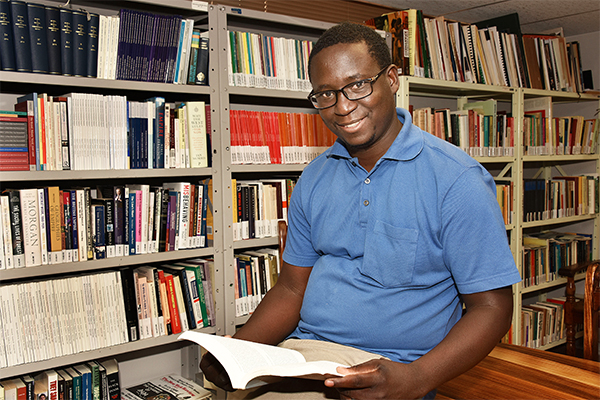Latest News Archive
Please select Category, Year, and then Month to display items
29 March 2022
|
Story Teli Mothabeng
|
Photo Supplied
![]() Philmon Bitso, Student Recruitment Officer, with the top-10 cohort of the class of 2021 Free State Star of Stars.
Philmon Bitso, Student Recruitment Officer, with the top-10 cohort of the class of 2021 Free State Star of Stars.
The Department of Student Recruitment Services at the University of the Free State (UFS) hosted its annual Free State Star of Stars competition at the Amanzi Private Game Reserve during the first week of March. The event saw some of the brightest young minds in the Free State inducted as UFS first-year students into this year’s top-10 cohort for the competition. This marks the first Star of Stars event since the beginning of the COVID-19 pandemic.
.jpg?Status=Master&sfvrsn=d7324e20_1)
This new cohort consists of a dynamic group of academically gifted students from Quintile 1-3 schools in the Free State who are currently enrolled for different UFS academic programmes, ranging from Medicine, Law, Education, and various Bachelor of Science courses. Many of these students had to overcome insurmountable challenges to perform as well as they did in their Grade 12 academic year and to become part of the top-10 cohort for the class of 2021. Due to the COVID-19 pandemic, the Department of Student Recruitment Services was forced to take a different approach to celebrate these deserving students; consequently, a weekend-long induction camp was the substitute for the annual gala dinner.
Apply for the 2022 Free State Star of Stars competition
The UFS realised the need to establish a platform that recognises and celebrates the diverse and, in most instances, difficult circumstances that disadvantaged schools (Quintile 1-3) are facing. Consequently, the Star of Stars competition was developed and established in 2016. This competition provides disadvantaged Grade 12 learners from all districts in the Free State an opportunity to showcase their excellence, while motivating them to aspire to achieve more.
Land a fertile field for historians
2017-12-25

Dr Admire Mseba, historian and researcher in the International Studies Group (ISG).
Photo: Charl Devenish
The use of land and the economics of Southern Africa at present is a contentious subject at almost every level of society. A historian and researcher who revels in happenings in these two areas, is Dr Admire Mseba, a postdoctoral research fellow in the International Studies Group (ISG) at the UFS.
Dr Mseba grew up in the Mberengwa region in southern Zimbabwe, known for cattle farming and mineral mining. While at the University of Zimbabwe, he became interested in economic history and archaeology, and completed his PhD at the University of Iowa in the USA. During his time there, Dr Mseba also became passionate about environmental history.
A historian's ability to think and engage critically on diverse subjects drew Dr Mseba to his field. Currently, he is busy with three research projects. Firstly, he is working on a book on social relations, about access to land in Zimbabwe. He is also examining regional and national efforts to control migratory pests during the 20th century, in particular, the red locust. In collaboration with a colleague at the ISG, Dr Mseba is also researching monetary systems in central Africa, covering the present-day countries of Zimbabwe, Malawi, and Zambia.
Dr Mseba believes future research opportunities in the domains of economic and environmental history abound. For one, the land question has been very topical in Zimbabwe for more than a decade—as it is now in South Africa—and needs more scrutiny. Regarding agrarian pestilences, he indicates the recent phenomenon of armyworm invasion. “There are so many opportunities for historians to investigate. There are so many ways to think about these things and trying to put it in perspective.”